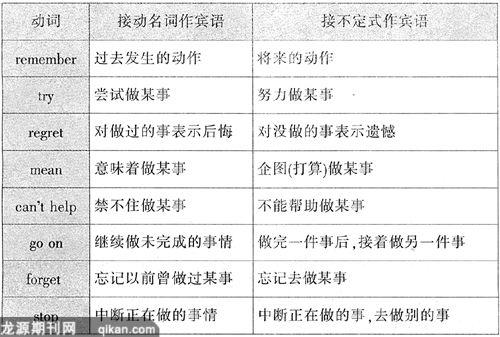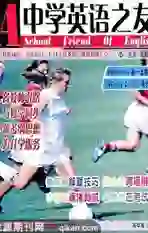V-ing形式学习三要素
2008-06-27张彦军
张彦军
V-ing形式是英语非谓语动词的重要内容,也是高考的热点考点。笔者认为,学习V-ing形式应掌握以下三个方面。
一、掌握V-ing形式的基本用法
1. 作主语
Making a speech in English is too difficult for me.
用英语作演讲对我来说太难了。
V-ing形式作主语时,也可用it作形式主语,常见于下列结构:
Its no use/good/useless doing something.
Its a waste of time (money)/worthwhile doing something.
There is no use doing something.
例如:Its no use crying over spilt milk. 后悔没有用。
2. 作宾语
(1)appreciate, avoid, bear, consider, dislike, delay, enjoy, escape, finish, hate, imagine, keep(on), mind, miss, practise, postpone, resist, risk, stand, suggest等动词及be used to, devote…to…, prefer…to…, cant help, feel like, insist on, put off, be worth等动词短语后必须接V-ing作宾语。
The squirrel was so lucky that it missed being caught.
那只松鼠很幸运,没有被抓住。
I can hardly imagine Peter sailing across the Atlantic Ocean in five days. 我简直不能想象彼得在五天之内就横渡了大西洋。
(2) remember, try, stop, regret, forget, go on, mean, cant help 等动词后跟V-ing形式与不定式作宾语表达意义不同,见下表。

比较:Seeing my mother cleaning the room, I cant help doing it, too.
看到妈妈在打扫房间我也禁不住干起来。
I cant help (to) do the cleaning, because I am busy making a cake.
我不能帮忙打扫房间,因为我在忙着做蛋糕。
I tried to remember to post the letters on my way to work, but I forgot to do so. 我想着在上班的路上把这些信件寄走,但还是忘了。
3. 作介词宾语
几乎所有介词后面均可接V-ing形式作宾语。
Mr. Reed made up his mind to devote all he had to setting up some schools for poor children.
瑞德先生决定把全部积蓄奉献出来为穷困孩子盖几所学校。
Tony was unhappy for not having been invited to the party.
因未被邀请参加晚会,托尼很不高兴。
4. 作表语
作表语常见于下列用法:
(1)说明主语的内容,若就其提问,用what。
My hobby is collecting stamps.
我的业余爱好是集邮。(collecting stamps说明我的业余爱好,就其提问是:What is your hobby? )
(2)说明主语的性质和特征,若就其提问用how。
The flowers in the garden are very inviting.
花园中的花很诱人。(inviting说明花园中花的性质是“很诱人”,就其提问是:How are the flowers in the garden?)
5. 作定语
(1)V-ing单独作定语时,放在所修饰的名词前面。
a. 说明被修饰名词的用途。
a sleeping car 一节卧辅车厢 drinking water 饮用水
a flying suit 一件飞行衣
b. 表正在进行或主动的动作,与所修饰的词有逻辑上的主谓关系,可转化为相应的定语从句。
He looked up at the falling leaves in the sky. (the falling leaves=the leaves which are falling) 他抬起头,看到空中下落的树叶。
c. 表被修饰名词的性质特点,其作用相当于一个形容词,也可转化为相应的定语从句。
Everyone present was moved to tears at the moving story. (the moving story=the story which is moving) 在场的每个人都被那个动人的故事感动得流下眼泪。(“动人”是故事的性质特点,所以应用V-ing形式作定语。)
(2)V-ing短语作定语时,放在所修饰的名词后,表正在进行的动作。
Who is the boy lying under the big tree? (Who is the boy that is lying under the big tree?) 躺在大树下面的那个男孩是谁?
6. 作宾语补足语
V-ing形式可接在某些感官动词(如hear, see, notice, observe, feel, find, catch等)及表“致使”意义的动词(如have, keep, leave, set, send等)之后作宾语补足语,表正在进行的或持续性动作。例如:
He looked around and caught a man putting his hand into the pocket of a passenger.
他环顾四周,正好瞧见一个人把手伸进一位乘客的口袋里。
7. 作状语
(1)V-ing可在句中作时间状语、原因状语、条件状语、方式状语和伴随状语等。(前面已讲过,在此不赘述)
(2)V-ing作状语时,其逻辑主语为句子的主语,因此应保持人称、数的一致性。
误:While looking at a map, a policeman came over and asked if he could help us.
正:While we were looking at a map, a policeman came over and asked if he could help us.
析:looking at的逻辑主语应是we,而不是a policeman。
但有些现在分词短语用来表示说话人对所述内容持有的态度和看法,这时,现在分词的逻辑主语和句子的主语不一致。这样的现在分词短语有:generally speaking(一般来说),judging from(从……来判断),considering(考虑到……),talking of(说到……)。例如:
(1)Generally speaking, parents care more about their childrens health than about their own. 一般来说,父母关心孩子的健康胜过关心自己的。
(2)Considering his inexperience, he did a good job.
考虑到他缺乏经验,他干得很不错。
二、掌握V-ing的时态和语态
V-ing有时态和语态形式,形式变化见下表(以do为例)

(1)V-ing被动语态的一般式在句中作主语、宾语、宾语补足语和定语,表正在进行的或一般性的被动动作。
Being exposed to sunlight for too much time may do harm to ones skin. 在太阳底下曝晒时间过长会对皮肤有害。
The party being prepared now will be a great success.
正在筹备的那场晚会将获得圆满成功。
(2)V-ing的主动和被动语态的完成式只作状语,表先于谓语动词的动作。
Having suffered from heart trouble for years, Professor White likes to take some medicine wherever he goes.
由于多年患心脏病,怀特教授无论走到哪儿,总喜欢把药带在身上。
Having been shown around the labs, we were taken to see the library. 带领我们参观了实验室后,又带我们去看图书馆。
三、掌握V-ing形式的创新形式
1. 带逻辑主语的V-ing复合结构
当特别需要强调V-ing形式所表示动作的执行者时,V-ing形式前要加一个形容词性物主代词或名词所有格,作为V-ing形式的逻辑主语。该结构常作主语、表语和宾语。
The presidents attending the meeting himself gave them a deal of encouragement. 总统本人亲自出席会议给予他们极大鼓励。
Would you mind Marys being left alone at home?
把玛丽一个人留在家里,你介意吗?
该结构若不出现在句首,可用人称代词宾格代替形容词性物主代词或用名词普通格代替名词所有格。若逻辑主语为无生命名词时,只能用普通格,而不能用名词的所有格。
Our teacher suggested our/us buying a new English-Chinese dictionary.
我们老师建议我们买本新英汉词典。
The noises of desks being opened and closed could be heard out in the street. 书桌掀开和关上的声音在大街上就能听到。
2. 带逻辑主语的V-ing独立主格结构
带逻辑主语的V-ing的独立主格结构在句中可作时间状语、原因状语、条件状语和伴随状语,其逻辑主语前也可加介词with,其中V-ing形式表进行或一般性动作。
It being very hot, we decided to go for a swim.
天气炎热,我们决定去游泳。
With the guide leading the way, they had no trouble in finding the enemys position. 有向导带路,他们不费力就找到了敌人的据点。
[巩固性练习]
1. Reading is an experience quite different from watching TV; there are
pictures ____ in your mind instead of before your eyes.
A. to form B. form C. forming D. having formed
2. ____ in the queue for half an hour, Tom suddenly realized that he
had left his wallet at home.
A. To wait B. Have waited
C. Having waited D. To have waited
3. More and more people are signing up for Yoga classes nowadays,
____ advantage of the health and relaxation benefits.
A. taking B. taken
C. having taken D. having been taken
4. The manager, ____ it clear to us that he didnt agree with us, left
the meeting room.
A. who has made B. having made
C. made D. making
5. The bell ____ the end of the period rang, ____ our heated
discussion.
A. indicated, interrupted B. indicated, interrupting
C. indicating, interrupted D. indicating, interrupting
6. Finding her car stolen, ____.
A. a policeman was asked to help
B. the area was searched thoroughly
C. it was looked for everywhere
D. she hurried to a policeman for help
7. European football is played in over 80 countries, ____ it the most
popular sport in the world.
A. makes B. to make C. making D. made
8. ____ his telephone number, I cant get into touch with him.
A. Knowing not B. Not knowing
C. Having not known D. Not having known
9. When I got back home, I saw a message pinned to the door ____
“Sorry to miss you, I will call later”.
A. reading B. reads C. to read D. read
10. ____ your composition carefully, some spelling mistakes can be
avoided.
A. Check B. To check
C. Having checked D. If you check
11. Though ____ money, his parents managed to send him to university.
A. lacked B. lacking of C. lacking D. lacked in
12. When asked by the police, he said that he remembered ____ at the
party, but not ____.
A. to arrive; leaving B. to arrive; to leave
C. arriving; leaving D. arriving; to leave
13. The missing boys were last seen ____ near the river.
A. playing B. to be playing C. play D. to play
14. She asked me to help her, ____ that she couldnt move the heavy
suitcase alone.
A. only to realize B. realizing
C. realized D. having been realized
15. Suddenly, a tall man driving a golden carriage ____ the girl and took
her away, ____ into the woods.
A. seizing, disappeared B. seized, disappeared
C. seizing, disappearing D. seized, disappearing
16. I couldnt do my homework with that noise ____.
A. going on B. goes on C. went on D. to go on
17. The discovery of new evidence led to ____.
A. the thief being caught B. catch the thief
C. the thief having caught D. the thief to be caught
18. Once your business becomes international, ____ constantly will be part of your life.
A. you fly B. your flight C. flight D. flying
19. What worried the child most was ____ to visit his mother in the
hospital.
A. his not allowing B. his not being allowed
C. his being not allowed D. having not been allowed
20. ____ by the teacher in class gave him a great deal of encouragement. A. Having praised B. After being praised
C. Being praised D. Praised
Key(3)
